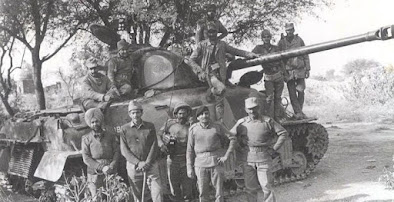The history in india pak war
The relationship between India and Pakistan has been one of the most complicated and volatile bilateral relationships in the world. The two neighboring countries, which were once part of the same country before the partition in 1947, have a long history of conflicts and disputes over various issues, including territory, politics, religion, and terrorism.
The root of the India-Pakistan conflict lies in the partition of British India in 1947, which created two independent states - India and Pakistan. The partition was a traumatic event that led to the displacement of millions of people and the deaths of hundreds of thousands of others. The violence and bitterness of the partition left a deep scar on the collective psyche of both nations, which has continued to shape their relationship to this day.
One of the most significant issues in the India-Pakistan conflict has been the dispute over the region of Kashmir. Both India and Pakistan claim the territory of Kashmir as their own, and the dispute over it has been a source of tension and conflict between the two nations for decades. The conflict has resulted in several wars between India and Pakistan, including the Indo-Pakistani War of 1947, the Indo-Pakistani War of 1965, and the Kargil War of 1999.
In recent years, the situation in Kashmir has worsened, with a rise in terrorist attacks and insurgent activities. Both India and Pakistan accuse each other of supporting and funding terrorist groups in the region. The situation has led to a significant escalation of tensions between the two countries, with both sides engaged in a military buildup and an exchange of aggressive rhetoric.
Another issue that has contributed to the strained relationship between India and Pakistan is their differing political and religious ideologies. India is a secular democratic republic, while Pakistan is an Islamic republic. The two countries have different political systems and religious beliefs, which have often led to clashes and tensions.
The relationship between India and Pakistan has also been influenced by their interactions with other countries, particularly the United States and China. Both countries have sought the support of these global powers in their efforts to assert their interests and influence in the region. The involvement of outside powers has often complicated the situation and contributed to the instability and unpredictability of the India-Pakistan conflict.
Despite the many challenges and obstacles, there have
been several attempts to improve the relationship between India and Pakistan. The two countries have engaged in several rounds of talks and negotiations, including the Lahore Declaration of 1999 and the Agra Summit of 2001. However, these efforts have often been undermined by the lack of trust and confidence between the two sides, as well as the deep-rooted issues and disputes that continue to divide them.
In conclusion, the India-Pakistan conflict is a complex and multifaceted issue that has defied resolution for decades. The conflict has been fueled by a range of factors, including historical grievances, political and religious differences, and external influences. While there have been some efforts to improve the relationship between the two nations, the situation remains tense and unpredictable, with the potential for further conflict and instability in the region. It is essential for India and Pakistan to engage in meaningful dialogue and work towards finding a peaceful and lasting solution to their differences.













0 Comments